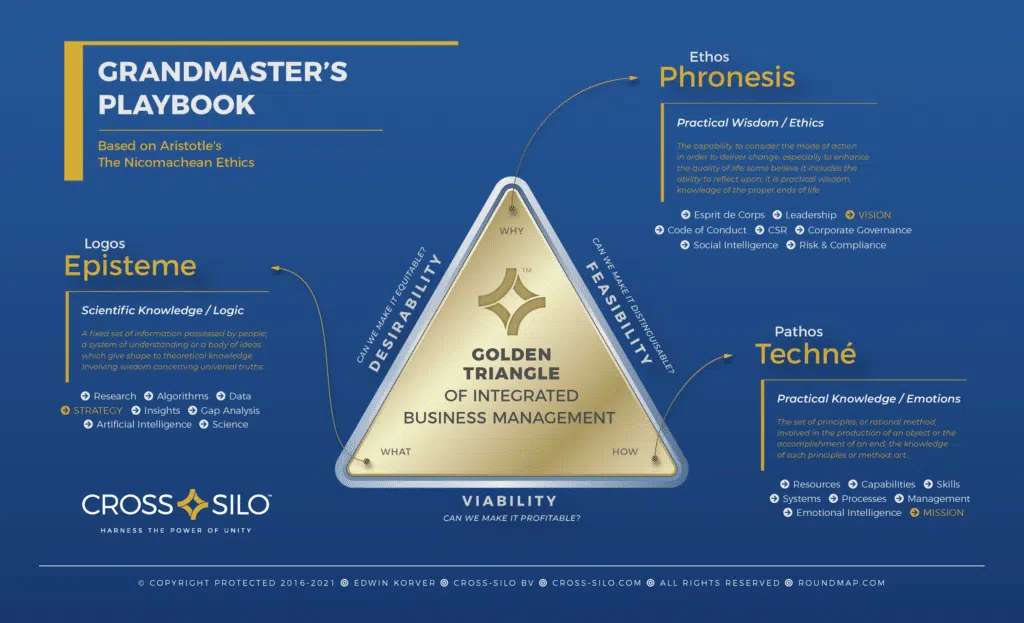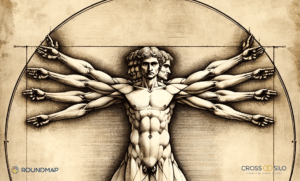When we’re faced with various risks, gaps, and constraints while trying to solve complex situations in a fast-moving, highly competitive market, we’re bound to make mistakes. How do you value what matters most in a given situation to make the right considerations and decisions?
Aristotle
Fortunately, many centuries ago, the Greek philosopher Aristotle provided us with a practical guide to tackle complex issues, called the Nicomachean Ethics. We will only scratch the surface of the many books (or essays) he wrote on ethics.
Aristotle suggested to view complexities from three angles (or lenses), Techné, Episteme, and Phronesis. We’ll explain each of these lenses below the following image. The angles will allow for better informed and more inclusive decisions on the events of both current as well as future events.
We’ve also added three conditions, Feasibility, Viability, and Desirability, to complete the framework with which to push your organization in the right direction.
Grandmaster's Playbook
Techné
Techné is what Artistotle used to describe practical knowledge. It is the set of principles, or rational methods, involved in producing an object or the accomplishment of an end; also the knowledge of such principles or method; sometimes referred to as artisanship.
Techné forces us to look at the problem from a perspective of available resources, processes, capabilities, skills, and systems ─ in light of executing the corporate mission.
The question to ask ourselves is: Is it feasible?
- Can we do it, distinctively?
- What’s our competitive edge? (on-stage and backstage)
- Is our competitive edge defendable?
- Is this edge still relevant?
- What are the practical gaps and constraints in terms of skills, resources, and capabilities?
Techné is closely related to pathos or emotions. Therefore, this aspect can be linked to Emotional Intelligence (EI), i.e., the capability of individuals to recognize their own emotions and those of others, discern between different feelings, and label them appropriately. Without EI, there is no empathy. And without empathy, there is no engagement. Empathy allows front office employees to relate to customer’s problems, while employee and customer engagement combined allows the business to grow.
Episteme
Episteme is about theoretical knowledge or science. It is a fixed set of information possessed by people, a system of understanding, or a body of ideas that shape academic knowledge. It involves wisdom concerning universal truths; science.
Today, Episteme is about research, algorithms, data, intelligence, insights, and analysis, to devise and adapt the business strategy.
The question to ask ourselves is: Is it viable?
- Can we do it profitably?
- How well do/should we perform in comparison?
- What’s our current share of the market?
- Can we increase productivity?
Episteme is closely related to logos or logic. It refers to the reasoning power in humans; logos was considered the agent of creation and the agent through which the human mind can apprehend and comprehend the cosmos. We’ve linked both, Episteme and Logos, to Artificial Intelligence (AI) as leaders rely more and more on data and algorithms to make informed decisions.
Phronesis
Phronesis is about practical wisdom or ethics. It is the capacity to consider the mode of action to deliver change, especially to enhance the quality of life; some believe it includes the ability to reflect upon; it is practical wisdom, knowledge of the proper ends of life.
Phronesis relates to leadership, the code of conduct, rules and regulations, compliance, and governance ─ in light of reflecting upon the corporate vision.
The question to ask ourselves is: Is it desirable?
- Can we do it, attractively?
- Are we doing the just thing?
- Do we comply with rules and regulations?
- Are we aligned with our moral code?
- Do we need to change our course of action?
Phronesis is related to Ethos. Ethos is the distinguishing character, sentiment, moral nature, or guiding beliefs of a person, group, or institution. Since ethos is what defines the group, it is what defines the culture. And culture and leadership are, as you know, closely related. We’re not judged by our words, rather by our actions. Additionally, we believe Phronesis is associated with Social Intelligence (SI): the ability to understand and manage people and to act wisely in human relations.
Conclusion
By perceiving complexities from three separate angles or lenses, leaders are bound to make better informed, less-isolated, and non-biased decisions:
- LENS 1 – Techné / Pathos / Emotional Intelligence:
– Does it affect what we do and how we do it?
– Does it affect the value that we create & deliver?
– Does it affect our mission? - LENS 2 – Episteme / Logos / Artificial Intelligence:
– Does it affect how well we do it?
– Does it affect the value that we can capture?
– Does it affect our strategy? - LENS 3 – Phronesis / Ethos / Social Intelligence:
– Does it affect our stakeholders?
– Does it affect our perception of customer value?
– Does it affect our future vision?
– Does it affect public scrutiny?
Any questions? Feel free to ask.












